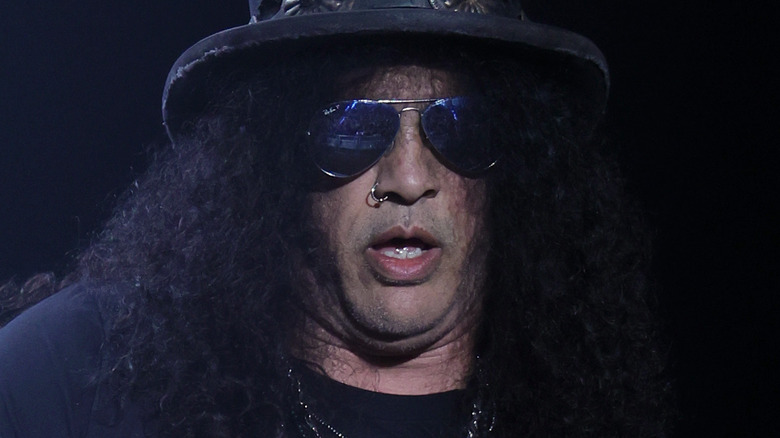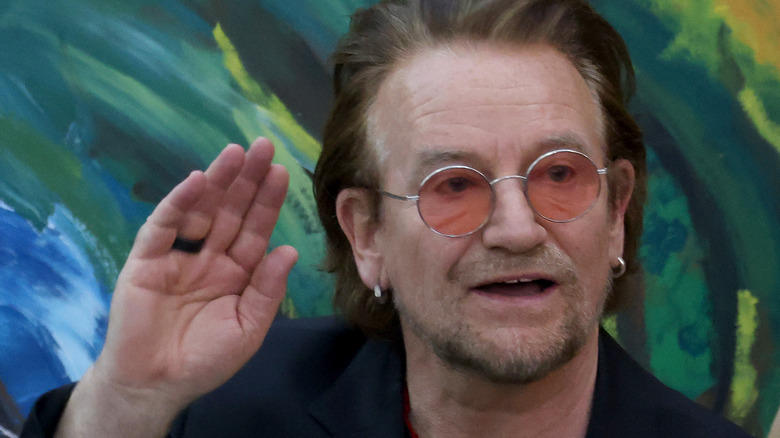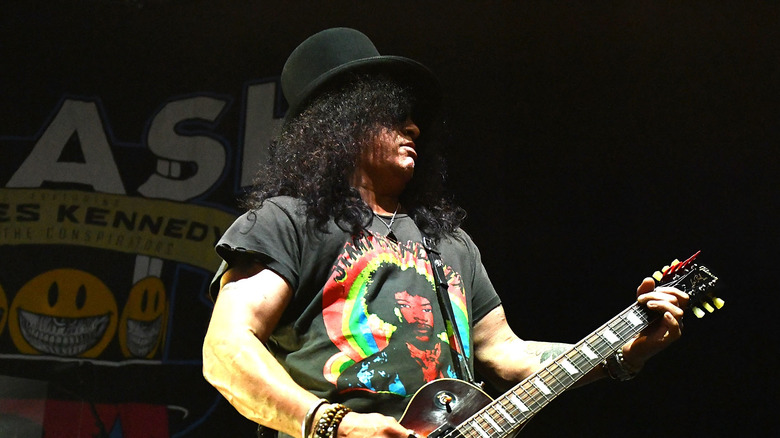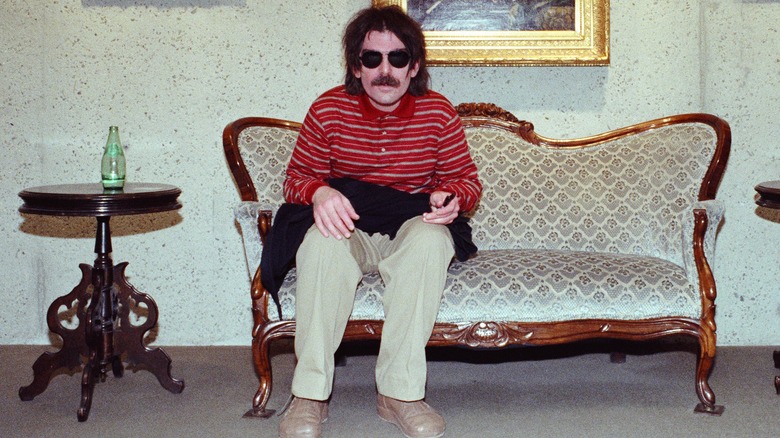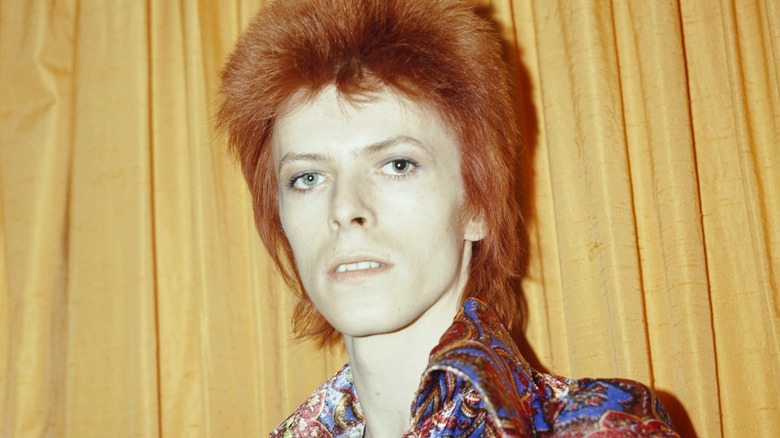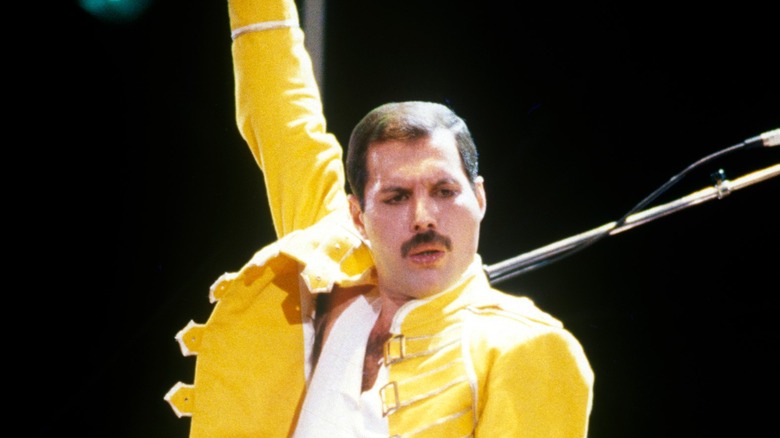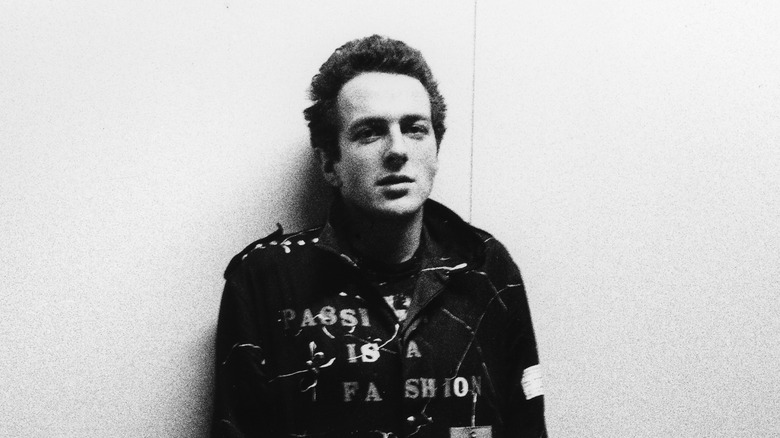Where These Iconic Rock Stars Got Their Stage Names
You may be familiar with the phrase, "what's in a name?" The quotation comes from William Shakespeare's "Romeo & Juliet," with the lines that follow suggesting that names actually matter very little: "That which we call a rose/ By any other name would smell as sweet," claims the titular heroine.
But try telling that to rock gods, who have a habit of switching their names around any which way to make them sound cooler than the names given to them at birth. In rock music, names matter for the bands themselves, their songs, their albums, and even individual musicians — many of whom feel as though developing a new name will add to their persona, and give them an extra dose of much-needed rock mystique. Some rockers ditch their birth names and opt to be known by a whole new name altogether, or else find themselves stuck with a nickname from before they were famous that they simply can't shake off.
So how did your favorite rock stars end up with their iconic monikers? Here are the stories behind some of the biggest names in rock history, and the often surprising ways those names came into being.
Axl Rose
Guns N' Roses may be best known for their incendiary late-eighties period, when the Los Angeles band reigned supreme thanks to their 1987 classic "Appetite For Destruction," but they have maintained a huge following throughout the decades despite periods of inactivity.
Much of the group's longevity and visibility in recent years is thanks to frontman Axl Rose, who maintained Guns N' Roses as a brand and touring act in the early 2000s, following the departure of many of his bandmates — including the iconic guitarist Slash (via Britannica). Rose was also responsible for eventually emerging in 2008 with the long-awaited "Chinese Democracy" album.
While Axl Rose now comes across as one of the most rock 'n' roll stage names imaginable, the truth is only the first part is made up, having been adopted by the singer with the formation of his first band, known simply as AXL, according to Ultimate Classic Rock. "Rose" is in fact Rose's birth name, that of his biological father, whom he didn't learn about until adolescence. Until then, he had been known as Bailey, but Rose reverted to his original birth name as his interest in music and performance grew.
Sting
Over the course of music history, the use of a mononym — a single name like those of Prince and Cher, for example — has gone hand in hand with legend status. And the lead singer and principal songwriter of The Police, Sting, is no exception, with a solo career that in many ways excelled the work that made him famous with his legendary pop-reggae band.
But as with many legends, there is a rather prosaic story behind how the name Sting came to stick. According to Sting's official website, the name came very early in his music career when he was performing in clubs in the North East of England, where Sting was born with the name Gordon Sumner. Sumner apparently had a habit of wearing striped shirts on stage, particularly yellow and black ones, which a fellow musician used to tease him for: His famous nickname was originally a playful insult.
The name has become so pervasive for the former Police frontman that it is now the only name he answers to. His wife, the actor and producer Trudie Styler, even calls the musician by his stage name at home, according to Time.
Bono
Despite continuing to enjoy worldwide success, critical acclaim, and massive sell-out tours, after four decades in the music business with his band U2 (per Britannica), lead singer Bono has become something of a divisive figure in recent years. Some of the derision Bono attracts is due, in fact, to his strange and jarring stage name — but how did he get it in the first place?
Though he is most commonly referred to today simply by the mononym "Bono," his original stage name during the early days of U2, in the 1970s, was "Bono Vox of O'Connell Street" (per "Bono on Bono"). O'Connell Street is in Bono's hometown of Dublin, while according to The New York Post, "Bono Vox" means "good voice" in Latin, a nickname which surely appealed to the singer's adolescent ego.
However, the official story doesn't mean that we should imagine the young members of U2 and their fellow musicians plucking Latin phrases out of the air to describe each other. As noted by Dublin Town, the name was likely inspired by Bonavox, a hearing aid store in the Irish capital that has been trading for more than half a century, and which the young musicians would have been familiar with when they were starting out in the 1970s.
The Edge
Bono isn't the only member of U2 to have a strange stage name. The other is The Edge, the veteran guitarist who originally went under his birth name of David Evans, via The New York Post. But how did Evans get his unique sobriquet? As it turns out, from Bono as well.
As Bono recalled to music journalist Michka Assayas in "Bono on Bono," Evans was originally referred to as "Inchicore" after a village just outside of Dublin. He was bestowed with his new nickname by Bono, who claims that "The Edge" was initially a reference to the shape of his guitarist's head, though he also says that it refers to The Edge's love of scaling heights and ascending high walls and ledges.
"Pretty much everyone calls me Edge ... My mum calls me Edge, so I guess that's about as official as you can get," the guitarist claims, according to The New York Post.
Iggy Pop
Few who saw Iggy Pop — aka Jim Osterberg Jr. — in the excessive days when he was the frontman of proto-punk pioneers The Stooges, in the late '60s and early '70s, could ever have guessed that he would emerge as rock 'n' roll's greatest survivor. Yet here he is, still making records and attracting an audience well into his eighth decade on earth, as of 2023.
Though Iggy only emerged as a solo star after The Stooges disintegrated, his music career goes further back in time than the influential band that made him a counterculture hero ... and his stage name prefigures his time as a Stooge, too.
As described in a 2019 New Yorker profile, Mr. Pop first formed a band way back in 1963, a group that played the surf rock and British invasion tunes that the teenage music nut loved. That band was called The Iguanas, and though the band fell apart after releasing just a couple of obscure recordings, his place in the band made him a known face on the Michigan music scene. Even after he left The Iguanas for another band called The Prime Movers, his role in the previous band stuck with him, so much that acquaintances would yell, "Iguana alert!" when Iggy entered a room. Eventually, Iguana was shortened to Iggy, the name he has gone by ever since.
Slash
Are there any better rock 'n' roll names than simply "Slash," especially when it comes to guitarists? The name has everything: It's confrontational, onomatopoeic, and is a reminder that the guitar itself is often referred to as an "ax" (per Merriam-Webster). But Slash's stage name isn't, in fact, all that it first appears.
As the Guns N' Roses lead guitarist — who was born in Britain with the name Saul Hudson before emigrating to the United States — recalled in an interview with Metal Hammer a decade ago (via Loudwire), he didn't come up with his own stage name at all. "My best friend's dad is an actor named Seymour Cassel, and we used to ditch school and hang out at his house and he used to call me Slash and it was just habitual with him."
The name had stuck long before Slash became famous with Guns N' Roses, but it was only when the guitarist was on tour with the band and he met Cassel again, that he was able to ask him what the strange nickname referred to. Per the same source, "Slash" is actually a reference to the slash symbol ("/"), because the young Hudson always seemed to be "hustling," moving from one activity to another in a blur.
Captain Beefheart
Blues and experimental rocker Don Van Vliet, aka Captain Beefheart, expanded the horizons of popular music in the late '60s and early '70s. Releasing with his Magic Band avant-garde classics such as 1969's "Trout Mask Replica" and 1970's "Lick My Decals Off, Baby," Beefheart pioneered the use of truly absurd lyricism and angular, non-standard compositions, making himself a legend in the process (via Britannica).
There are numerous stories surrounding how Beefheart happened upon his strange stage name. Beefheart was a school friend — and subsequent collaborator — of guitar maestro Frank Zappa. In Zappa's biography, he claims that the phrase "beef heart" originated with Van Vliet's uncle, Alan, who used to expose himself to the young singer's girlfriend. Apparently, the phrase was the bizarre way the older man described his genitals.
However, on a memorable appearance on Late Night with David Letterman in 1982, on which Beefheart was promoting his final album "Ice Cream for Crow," the Magic Band leader explained that his name actually referred to him having a "beef in my heart with society," especially with regard to cruelty towards puffins he had once witnessed at a Los Angeles marina.
Ringo Starr
Beatles legend Ringo Starr is used to being the butt of jokes. As a member of the biggest band of all time, many have questioned his drumming ability (per Sweetwater), while in movies such as "Yellow Submarine" (via Monochrome Yoshi) he is typically portrayed as the Beatle who is down on his luck.
In reality, Starr is one of the most successful and respected musicians in history, while even in the early days he was known as one of Liverpool's finest pop drummers. As Starr — who was born Richard Starkey — recalls in "The Beatles Anthology," his stage name actually prefigured his time in The Beatles. Prior to joining The Beatles, Starr kept the beat for fellow Liverpool band Rory Storm and the Hurricanes, who insisted on adopting stage names. Starr was a seemingly obvious glamorization of the drummer's birth name, Starkey, while "Ringo" was reportedly a playful insult that the drummer received from people in the street, in response to the many rings he had taken to wearing on his fingers.
David Bowie
Having launched a thousand arguments about its correct pronunciation since the British singer rose to prominence in the early 1970s (per the BBC), the name David Bowie has remained a huge draw since the starman's unexpected death in 2016. But where did he get it from?
According to "Starman: David Bowie — The Definitive Biography" by Paul Trynka, the musician who found fame with personas including Ziggy Stardust, Aladdin Sane, and The Thin White Duke, was originally given the birth name David Jones. Though Jones is a common name in the UK, the performer originally used it in previous bands such as The Lower Third — though as Davy Jones of The Monkees had risen to prominence, he was keen to distinguish himself. While he adopted the stage name "David Jay" for a brief period as the sax player for a band called The Kon-Rads, he eventually took the name Bowie not, as one might assume, from the inventor of the knife, but from a character in the western "The Alamo" called Jim Bowie.
The musician became so enamored with the character that he began to replicate his look by wearing a leather jacket, after which the name stuck.
Bob Dylan
Bob Dylan was raised with the name Robert Allen Zimmerman in the Minnesota mining town of Hibbing, where his father's name adorned a well-known furniture company, according to Britannica. The musician would become one of the most celebrated intellectual songwriters of the 20th century, and be rewarded for his lyrical mastery with a Nobel Prize in Literature in 2016.
Dylan's stage name is a reference to Dylan Thomas, the Welsh poet whose fusion of romanticism and modernism was an obvious influence on the folk-rock singer (per Britannica). However, there is more to Dylan's stage name, as he explains in his memoir: "Chronicles: Volume One."
Though for a short time Dylan had performed with the stage name Elston Gunn, the singer wanted a name that better reflected his actual identity. He had considered playing as Robert Allen, simply using his first two names, and dropping Zimmerman. However, he was also conscious of how his name would look in print. To make it more interesting, he considered challenging the spelling of "Allen" to "Allyn," preferring how it looked. It was then when he came across a book of Thomas' poems that he recognized the resemblance between the two names, and chose to adopt it, preferring the impact of the "D" of Dylan to the "A" of Allyn. However, he didn't like the sound of the name "Robert Dylan," and as there were many musicians at the time who called themselves "Bobby," he went with "Bob," which, he says, took some getting used to.
Freddie Mercury
Arguably the most celebrated frontman of all time, Queen icon Freddie Mercury is remembered today for his incredible onstage charisma and ability to hold huge audiences in the palm of his hand (per Britannica).
While Mercury is one of the biggest names in British rock, he was born as Farrokh Bulsara in Zanzibar, now Tanzania, and his childhood was spent overseas. According to Metal Head Zone, the future star spent his school days in India, where he picked up the nickname "Freddie," which he continued to use after his family emigrated to the U.K.
The derivation of "Mercury," however, came much later. According to an Instagram post by Queen guitarist Brian May (via Metal Head Zone), the name came a full three years after the formation of the band in 1970. And somewhat strangely, the name is a reference to one of Mercury's own lyrics: those of "My Fairy King," which includes the phrase "Mother Mercury." In the song, the mother was reportedly Mercury's own, but the name stuck in his head and emerged as a worthy rock monicker.
Joe Strummer
Though best remembered as a founder member of the hugely influential British punk band The Clash, singer and guitarist Joe Strummer — who was born David Mellor — had a long and distinguished career before his untimely death in 2002 at the age of 50.
Per Time Note, the musician first began his career as a busker on the streets of London — where he originally went by the name "Woody" after his hero Woody Guthrie — and played in a number of underground bands before forming the Clash with co-frontman and lead guitarist Mick Jones. After their disbandment, Strummer continued to be a popular performer, enjoying a career with his new band, The Mescaleros, and playing for a time with Irish punk rockers, The Pogues.
However, Strummer was self-deprecating when it came to his own musical abilities, as reflected in his stage name, which suggests that strumming chords, rather than playing lead solos, was the most he was capable of. There was some truth to this, but for a good reason. Per the same source, Strummer was left-handed, but had been taught to play his instrument in a right-handed fashion. Effectively, he was playing backward, limiting what he could do. Nevertheless, he played that way for his entire career — and made some iconic punk records in the process.
